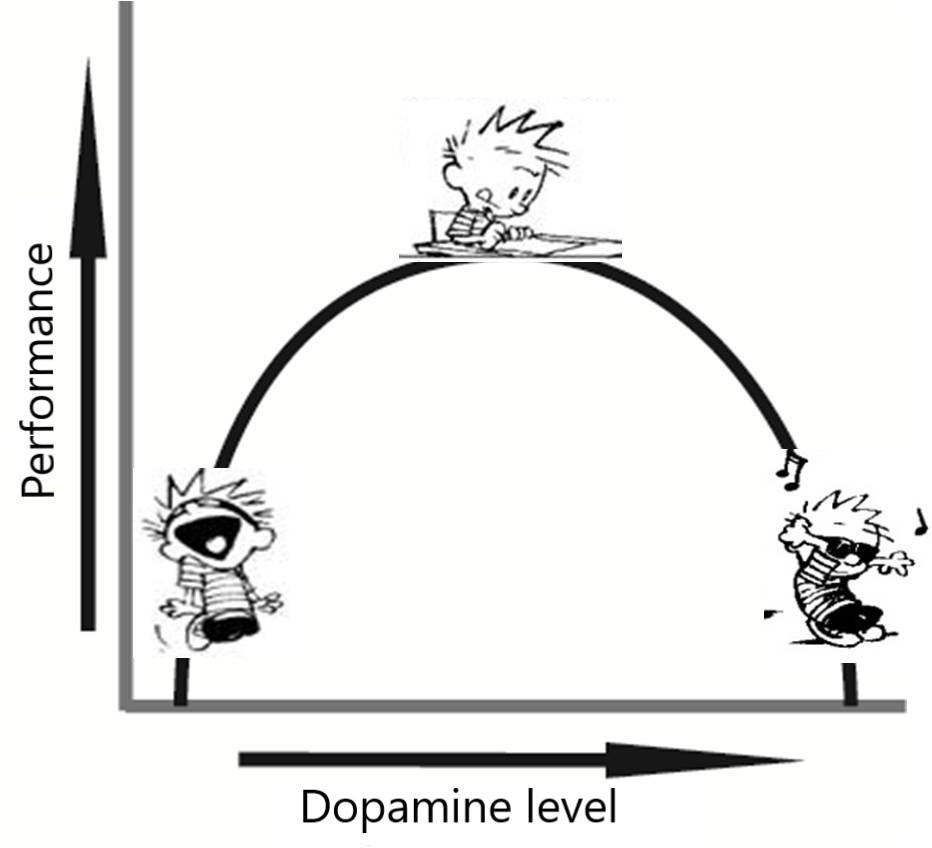Dopamine is important for keeping information up to date. Take, for example, your knowledge of restaurants. If you’re disappointed by the food in one place, you’ll know not to go there the next time you go out for dinner. And if the food is surprisingly tasty, you’ll adjust your expectations for your next visit. Keeping your knowledge up to date requires you to learn from previous experiences, whether they were negative or positive. In other words: You learn from rewards and punishments. If the dopamine levels in your brain change, possibly by taking Ritalin, your sensitivity to rewards and punishments changes.
Personal differences
Previous research has shown that the effects of medication such as Ritalin can drastically differ between people. Depending on one’s personal dopamine level, additional dopamine can either improve or decrease one’s studying performance. Increasing dopamine levels can help someone who has little dopamine to study better but can have negative results for someone who already has an optimal dopamine level.
Learning rewards and punishments in the lab
During my PhD, I researched the effects of Ritalin on learning rewards and punishments in students without ADHD. To learn rewards and punishments in the lab, my participants performed a computer task in which they were repeatedly shown two pictures. One picture was always followed by a reward (a happy smiley), whereas the other was always followed by a punishment (an angry smiley). The outcome following each picture was occasionally altered during the experiment. Participants would predict which picture would be followed by a reward and which would be followed by a punishment. By measuring the number of mistakes after the outcomes were altered, we can find out how well someone learns from rewards and punishments.
Ritalin in students
Participants visited the Donders Institute twice to perform my computer task. During one visit, they were given a Ritalin pill and during the other visit, they were given a placebo (a pill with no effects). I found out that the effects of Ritalin differed between people. After taking Ritalin, some participants learned more from rewards, whereas others learned more from punishments. Participants’ scores on a working memory task, which are related to their dopamine levels, could predict these differences. Moreover, Ritalin altered the balance between learning from reward and punishment. Participants that improved in learning from reward became worse in learning from punishment and vice versa. In other words: Ritalin not only improves learning, but also causes impairments, depending on the type of task. Generally, people with ADHD have lower levels of dopamine, meaning that Ritalin can have a different effect on the learning performance of students without ADHD than on that of students with ADHD.
During the summer we republish some of our best blogs that have only been published in Dutch. This is a translation of the formerly published Donders Wonders blog post: Een pilletje om beter te leren?
Since this blog’s 2014 publication, there have been some other interesting findings regarding Ritalin use for cognitive enhancement. Its effects depend on the type of task that participants perform in the lab, drug dosage, sex, etc. Overall, research findings so far have been rather mixed, perhaps because healthy volunteers often display a ceiling effect when performing tasks since they already perform at an unimpaired, optimal level and can use compensatory, high functioning strategies. In any case, there hasn’t been enough evidence to prove that Ritalin actually increases cognitive function and we don’t know very much about its long-term effects in people who don’t necessarily need it.
Original Author: Marieke van der Schaaf
Translator: Wessel
Editor: Christienne
